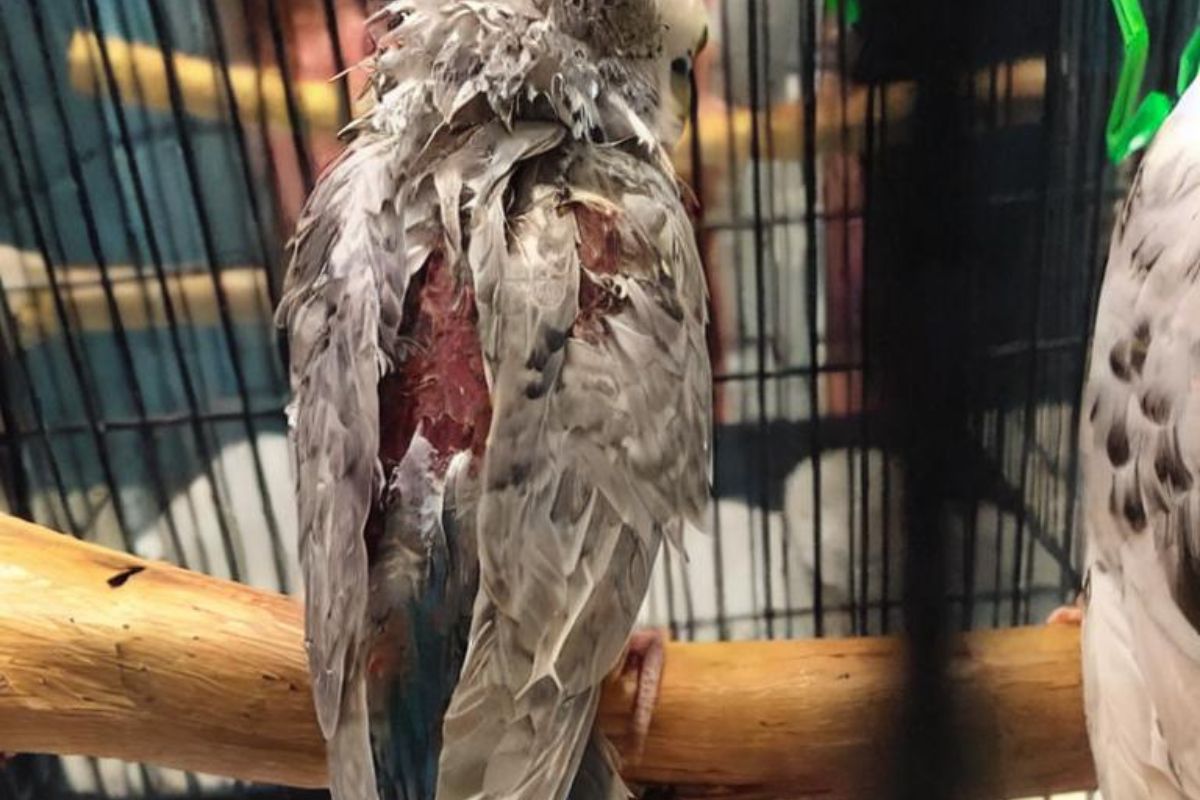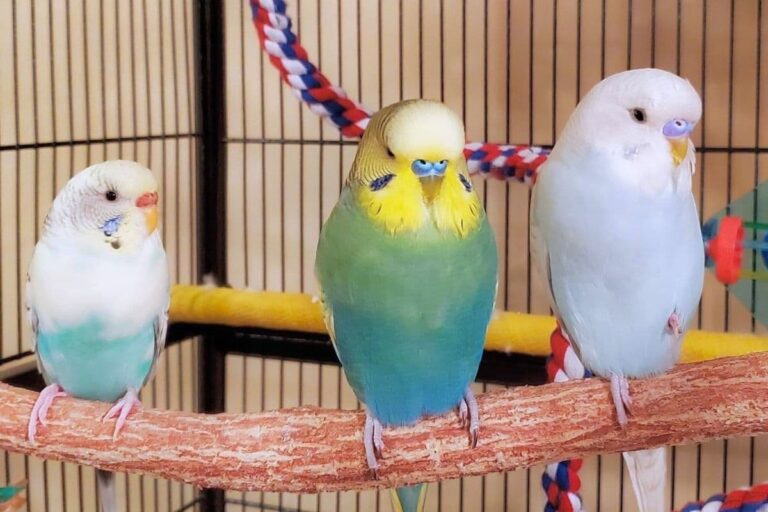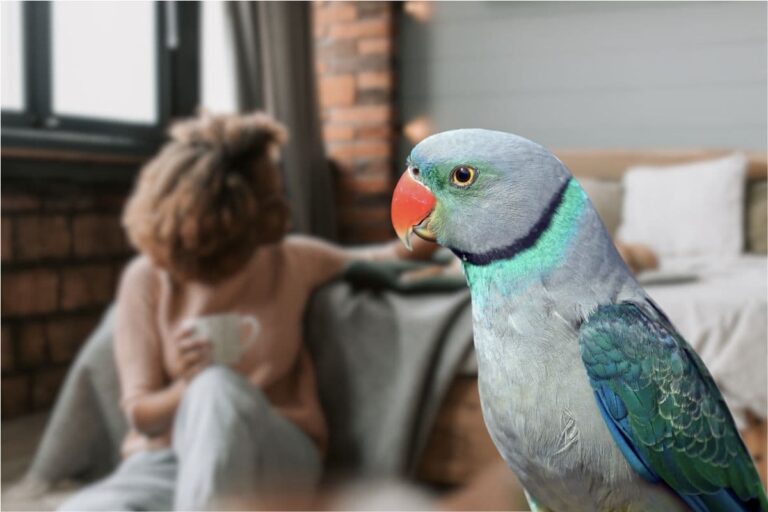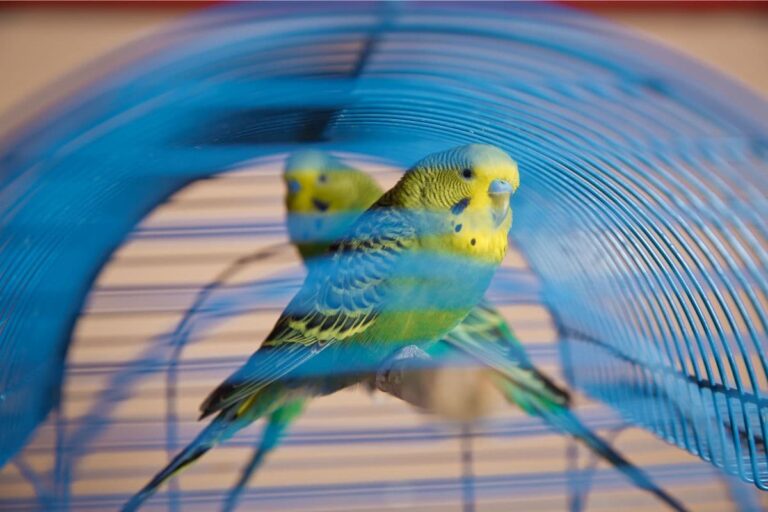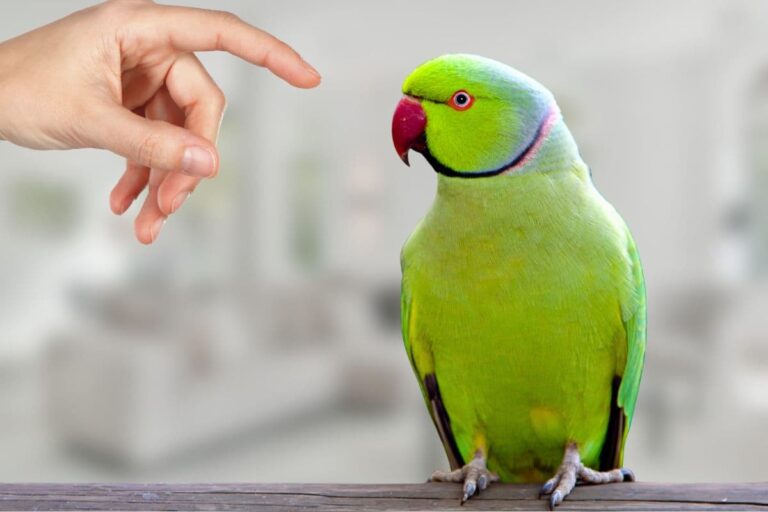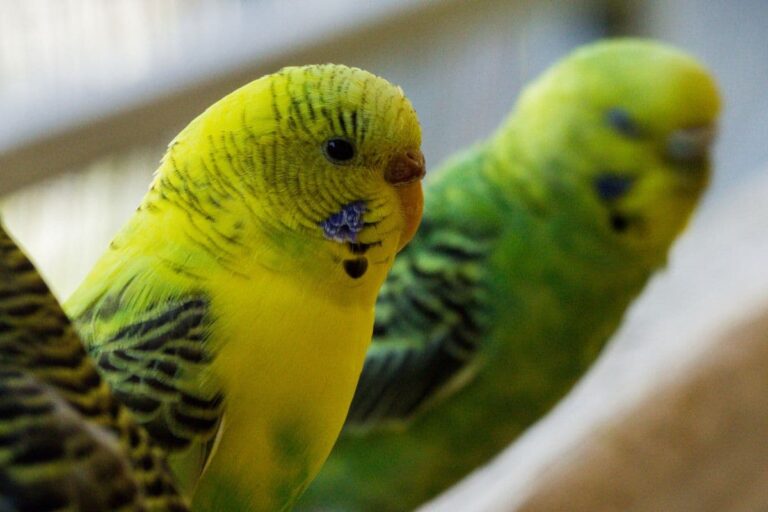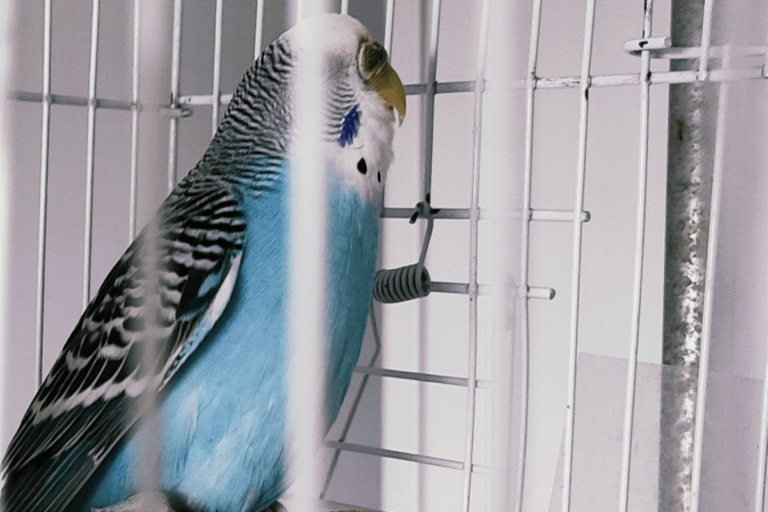Parakeet Losing Feathers – Why This Happens
Disclosure: The opinions expressed in this post are my own. This post may also contain affiliate links, which means that I will receive a commission if you decide to purchase through my links, at no additional cost to you. As an Amazon Associate, I earn from qualifying purchases.
Nobody wants to have bald patches appearing on their pet parakeet! However, it does happen and for many reasons.There are several causes of feather loss in parakeets, and understanding what they are can help you figure out why your parakeet has started losing feathers.
In this article we’ll explain what the main reasons for a parakeet to lose its feathers are, what’s normal, what’s not, and how to alleviate any current problems or stop it from happening again.
Molting
As your parakeet ages, its feathers will go through a process called molting. Molting is an essential biological process where old feathers are replaced by new healthy feathers. You’ll notice a significant amount of molting when they are acquiring their adult plumage.
It’s usually nothing to worry about when your parakeet molts—this is a natural and perfectly normal process for healthy parakeets. Molting does take energy, however, so if you recognize that your parakeet is molting during a time of stress such as illness or after an injury, this could be cause for concern.
The molting process should generally be monitored to ensure the health of your bird. If the amount of feather loss appears excessive or if bald spots start appearing on your bird’s skin near the base of the new feathers that are growing in, these can signal more serious underlying concerns such as diet deficiencies, parasites or internal issues. In any case, make sure to keep an eye on your pet’s progress as they go through their molt!
Viral or Bacterial Infection
Parakeets can lose their feathers through viruses and bacteria. Viruses, like avian pox, psittacine beak and feather disease (PBFD) and parrot fever, can cause a parakeet to pull its feathers out as a stress response to the virus. Bacteria, such as streptococci and staphylococci, may also cause a parakeet to pull its feathers out in both an immune response or due to allergies caused by toxic substances on the feather tips.
Parakeets may pick up such infections from bird droppings, contaminated water, or contact with other infected birds.
If your parakeet is losing its feathers and you think it may be caused by some kind of virus or bacterial infection, then you should take your parakeet to the vet right away so that your vet can identify the problem and administer any necessary medications. Additionally, you should check with your local pet store to see if they have any treatments or preventatives available specifically for viral/bacterial feather-loss in parakeets.
Fungal Infection
Fungal infections are particularly common if you house your parakeet in an area with high humidity and dampness. These fungal spores love wet environments, which make it easier for them to colonize and spread across your parakeet’s body. Fungal infections can cause your parakeet to lose their feathers in patches, or even in large clumps depending on how severe the infection has become.
It’s important to get a diagnosis from a qualified avian veterinarian right away if you suspect your parakeet may be suffering from a fungal infection. Treatment usually involves a course of antifungal medication along with keeping the cage environment sanitized, ventilated, and free from moisture build-up.
Parasites
Parasites such as mites, lice and even fleas can invade the feathers of your bird, causing irritation and itching for your parakeet. This can lead to your parakeet plucking out its own feathers in an attempt to relieve the itching.
These parasites are typically found around the wings, tail, neck, head and feet — mostly anywhere with direct contact to other parts of the body or feathers. To avoid transmission of parasites between birds, make sure your parakeet has its own cage with proper cleaning machinery that removes droppings regularly.
Feather Plucking
Feather plucking is one of the most common reasons why parakeets might begin to lose feathers. A combination of boredom, stress, or anxiety can cause a parakeet to start pulling out its own feathers as a way to cope with its emotional distress. Over-preening will eventually lead to bald patches appearing on your bird’s skin and you may even see some bare areas with no feathers at all.
If your parakeet is plucking their feathers, it’s time for you to find out why. Here are some common issues that lead to feather plucking in parakeets.
Boredom
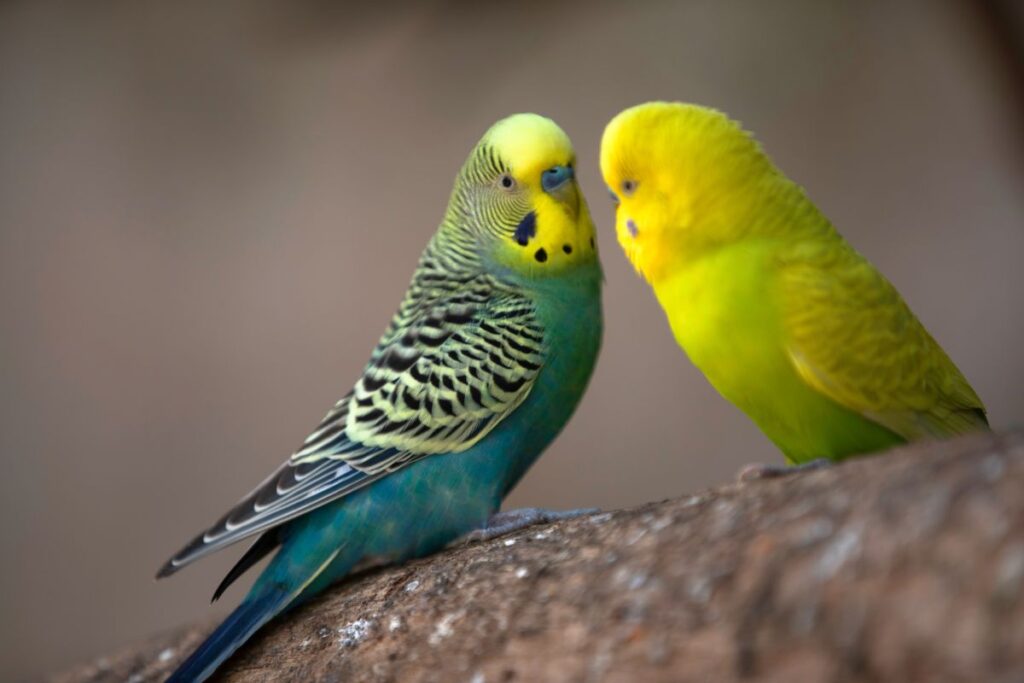
One of the most common reasons parakeets lose feathers is because they are bored or isolated. Parakeets are social creatures and need to interact with others of their kind in order to stay healthy and happy. If your parakeet is the only bird in the house, he may become bored and start plucking his feathers out of boredom or loneliness. To prevent this, make sure your parakeet has plenty of toys to play with and spend time each day interacting with him. You can also consider introducing a companion or a cage mate so that your parakeet has someone to interact with throughout the day, even when you are not around.
It’s important to provide your parakeet with regular mental exercise and creative outlets. For example, hang arm swings, ladders or bungee cords in its cage to give it something new and exciting to investigate. You can also switch up its perches on a regular basis as well as offer different toys that haven’t been seen before.
By letting your parakeet have time outside its cage each day, it will be able to explore new places and interact with people more often—both crucial for birds who are used to being in close contact with their flock members. Plus, you should always keep providing those daily doses of scratchable treats so that your parakeet has something fun and delicious to look forward to!
Stress
Another common reason for feather loss is stress. Parakeets are very sensitive creatures and can get stressed easily. Many parakeet owners don’t realise that small changes in the bird’s environment can cause significant anxiety for them. If your parakeet is plucking his feathers out, it could be due to stress from a noisy environment, being in a new place, having non-bird safe air fresheners around, or having too little space.
If your bird is showing signs of feather plucking due to stress, there are several things you can do to help reduce their anxiety. Ensure your parakeet has plenty of safe places to hide and perch – such as high up on shelves and behind curtains. Provide appropriate toys and activities they can explore such as wooden ladders and swings. Be sure that any loud music or TV is turned off at night so your bird gets enough restful sleep – which will help reduce their stress levels significantly. Also, make sure it’s not being bothered by other pets in the house.
Malnutrition
Malnutrition is probably one of the most common cause of feather plucking in parakeets. If your bird is not getting the proper balance of proteins and fats, then it could lead to feather plucking. In some cases, deficiencies in different vitamins can also lead to the same condition.
When a parakeet is malnourished, it may try to relieve the itchiness by pulling and plucking its own feathers. This behavior must be identified and treated quickly or else it can potentially harm your pet’s overall health and well-being.
It’s important to keep an eye on what your parakeet is eating – if you notice that they’re not eating a healthy diet, consider switching their food immediately. Be sure to offer a variety of nutritious foods such as fresh vegetables, fruits, seeds and nuts for them to munch on throughout the day. You should also make sure that you give them access to high-quality bird supplements in order to provide them with the necessary nutrition their body needs. With the right care, your parakeet will soon back in optimal health!
Will My Parakeet’s Feathers Grow Back?
The good news is that, in most cases, parakeets who are losing feathers will have their feathers grow back. Parrot molting usually occurs seasonally when warmer temperatures result in larger amounts of daylight. During this time, they’ll shed old bird feathers and replace them with new ones.
The larger pin feathers located on the main wing and tail feathers tend to grow our pretty fast. These are important feathers that help a parakeet to fly and maneuver in the air. Smaller feathers, such as those located on the head, neck, and chest may take a bit longer to grow back.
However, if your parakeet is experiencing excessive feather loss or isn’t replacing the lost feathers after a reasonable amount of time has passed, then it could indicate a more serious problem with your bird’s health and you should seek veterinary advice. Nutrient deficiencies caused by poor diet or illness can cause long-term feather loss and other issues if not treated swiftly. Damaged feather follicles may also lead to a delay in feather regrowth or even never growing new ones again.
To keep your parakeet healthy and ensure that its feathers re-grow as quickly as possible, make sure that you’re providing your pet with a balanced diet containing the proper vitamins, minerals and proteins. You should also make sure that it has plenty of access to sunlight so that its body can produce the necessary hormones for plumage growth.
What to Do When My Parakeet is Plucking Its Feathers
When your parakeet starts to pluck its feathers, it’s important to take action right away. This behavior can be caused by a variety of factors, such as stress, boredom, or a health issue. If it becomes a habit, it can cause adverse health effects and even death.
The first step in handling feather-plucking is to identify the underlying cause. Assess your parakeet’s living environment and diet for any possible triggers and address them accordingly. Is she feeling isolated? Make sure she has plenty of toys and companionship. Does she seem bored? Try changing up her routine and providing stimulating activities like bird swings or puzzles that reward her with treats when she solves them. Does she have access to an appropriate diet? Make sure she’s getting all the necessary nutrition from her food and supplements, if needed. Some birds need extra vitamin A in their diets which can help replace lost feathers faster.
Once you’ve identified any potential causes of the feather-plucking, you’ll want to take steps to prevent it from happening in the future. Provide enrichment activities that don’t involve plucking, such as preening activities or playtime with other birds. Consider calming aromatherapy sprays that can help ease anxiety levels as well as antioxidant supplements which may also help reduce feather loss due to oxidative stress in the body. Finally, make sure your parakeet has plenty of space or a large enough cage or aviary to move around and explore.
Is Molting Uncomfortable for My Parakeet?
Molting is a natural part of your budgie’s life, so they typically aren’t uncomfortable when they shed their old feathers. Your parakeet may only feel slightly uncomfortable when new pin feathers start to grow out, causing slight itch or irritation.
The process of molting, or shedding feathers, is a natural occurrence for all birds. During this time, your budgie may seem a bit lethargic and uninterested in playing or eating as much as usual. This is perfectly normal behavior and nothing to be concerned about. Your budgie is simply conserving energy to grow new feathers.
What Can I Do to Help My Parakeet During Its Molt?
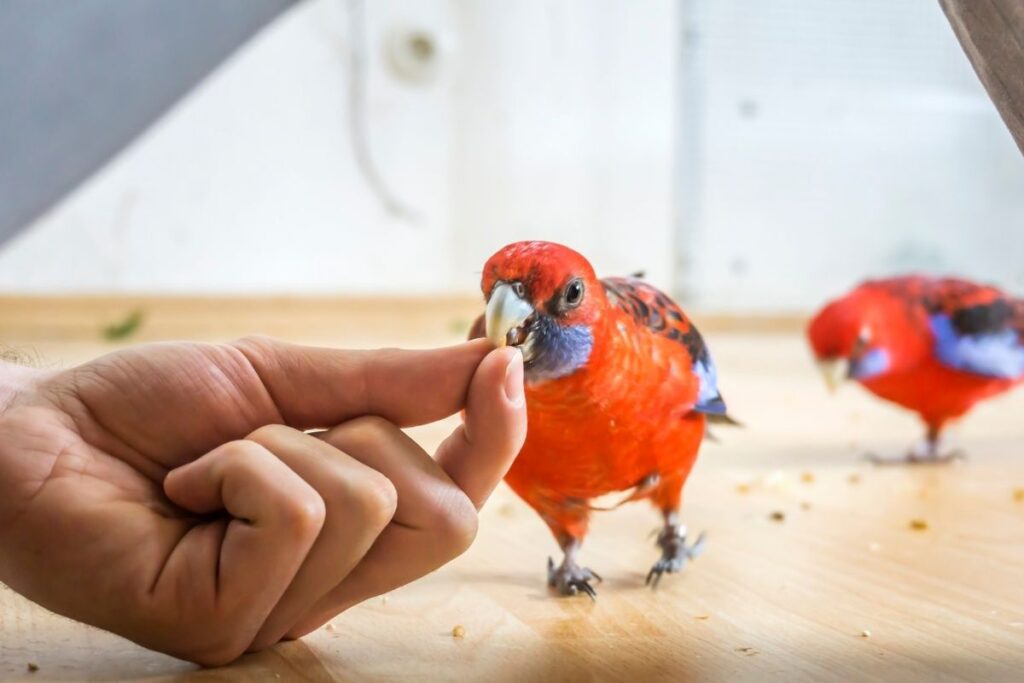
While molting is not generally a cause for worry (unless there is severe feather loss), there are a few things you can do to help your budgie through the process.
Make sure your budgie has plenty of freshwater and a healthy diet rich in vitamins and minerals. You may also want to consider adding a calcium supplement to your budgie’s diet during molting season.
Also, provide your budgie with plenty of toys and perches to help maintain its muscle tone and keep its mind occupied, so that it avoids excessive preening.
And lastly, try to minimize stress in your budgie’s environment as much as possible during this time.
Final Words
So if you’ve noticed that your parakeet has been losing feathers recently, it’s important to take steps and get them medical attention if needed right away. While feather loss can sometimes be caused by natural molting and is nothing to worry about, other times it could be caused by something else—like an infection or disease.
Be sure to take the necessary precautions to make sure your feathered friend stays safe and healthy!



